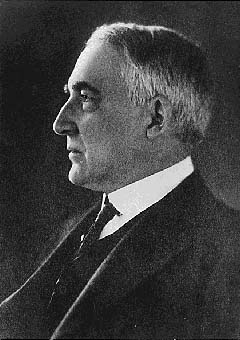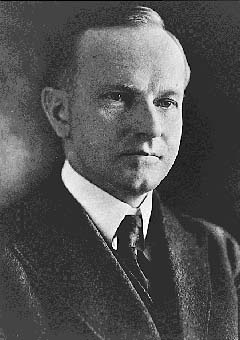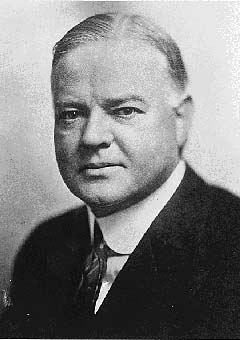Republican Era of "Normalcy" 1921-1933

Warren Harding 1921-23
|

Calvin Coolidge 1923-29
|

Herbert Hoover 1929-33
|
Harding Era
- 1920 - Jan. 16 Prohibition began, one year after ratification of the 18th Amendment; Aug. 26 ratification of the 19th Amendment gave women the right to vote; In the presidential election Nov. 2, Harding/Coolidge defeated James Cox/Franklin Roosevelt and Eugene Debs 60.4%-34.2%-3.4% (404-127-0); the election returns were broadcast by the new KDKA commercial radio station in Pittsburgh.
- 1921 - March 4 inauguration of Harding; Andrew Mellon was Secretary of the Treasury from 1921-1931 who cut taxes and the budget; Mellon established the Budget Bureau in Treasury Dept. under Charles Dawes who created Secret Service Uniformed Guards for White House 1922; despite Mellon's cost-cutting, the number of employees in the federal government doubled in 1920s. Ohio boss Harry Daugherty became Attorney-General; Albert Fall was Secretary of Interior; Herbert Hoover was Secretary of Commerce who sought voluntarism and associationalism to create order and stability and cooperation; Apr. 10 Congress passed the Sheppard-Towner Maternity and Infancy Act as the first social welfare law funded by the federal government in U. S. history; June 1 Tulsa Oklahoma race riot killed 85; July 14 Sacco and Vanzetti convicted of murder; July 21 Billy Mitchell's airplanes sank battleship; Dec. 13 Washington Conference ended with Four-Power Pact; 1921 recession caused 12% unemployment; 1st national Washington Conference on Unemployment but no federal help except $450m for state public works; Federal Highway Act 1921 gave matching funds to states for roadbuilding, funded by gasoline tax (rose from 1 cent in 1919 to 4 cents in 1929), due to growing popularity of automobile, especially the Model T of Henry Ford
- 1922 - Fordney-McCumber Tariff raised import duties; railroad strike ended with anti-union court injunction from AG Harry Daughtery; In December Louis Armstrong joined King Oliver's jazz band in Chicago and became one of the pioneers of the new popular music.
- 1923 - Mar. 3 Henry Luce began publication of Time magazine, an example of the New Media that emphasized advertising and images and modernism; Mar. 4 Harding signed the Agricultural Credits Act granting loans but farmers instead sought parity (1914 prices) through high tariffs and price supports as proposed by McNary and Haugen each year starting in 1924; Oct. 25 Senate began investigation of the Teapot Dome scandal; Harry Daugherty of the "Ohio gang" that met at the "House on K Street" to drink and gamble, failed to prosecute graft in the Veterans Bureau where chief Charles Forbes was sentenced to 2 years for fraud and bribery; Daugherty took $75,000 bribes from bootleggers and was replaced by Harlan Fiske Stone who reformed the Attorney-General's office and put J. Edgar Hoover in charge of the infant FBI; Aug. 2 Harding suffered a stroke after a long tour to Alaska and died in San Francisco; Calvin Coolidge took oath of office in Vermont from his father, a justice of the peace, in the light of a kerosene lamp on the kitchen table.
Coolidge Era
- 1924 - Feb. 12 the Paul Whiteman Orchestra played George Gershwin's "Rhapsody in Blue" in New York; April 17 Marcus Loew completed the merger of Metro Pictures and Goldwyn Pictures and Louis B. Mayer Company into the new MGM studio at Culver City; May 19 Congress overrode Coolidge's veto and passed the soldier's bonus bill; May 26 Congress passed the Immigration Restriction Act based on national quotas, and created the U. S. Border Patrol and the INS to enforce the act; In the presidential election Nov. 2, Coolidge/Charles Dawes defeated John Davis/Charles Bryan and the Progressive Party of Robert LaFollette/Burton Wheeler 54%-28.8%-16.6% (382-136-13); The first Macy's Thanksgiving Parade caused national attention on the toy industry, and new toy departments appeared in department stores.
- 1925 - June 6 Walter Chrysler founded the Chrysler Motor Company; Aug. 8 march of 40,000 Klansmen in Washington DC.; Sept. 10 A. Philip Randolph founded the Brotherhood of Sleeping Car Porters.
- 1926 - Feb. 26 Coolidge signed $388m. tax cut; Dec. 14 was the grand opening of the Savoy dance hall at 596 Lenox Avenue between 140th and 141st streets in Harlem and became a center of the new mass culture of uninhibited sensual jazz music and dancing, broadcast by radio, distributed in phonograph records, a means of escape for working-class immigrants. Harlem was also the center of the Harlem Renaissance that included the poet Langston Hughes, editor Alain Locke who had published The New Negro in 1925, painter Aaron Douglas, radical activist Claude McKay, musician Duke Ellington who played to white audiences and national radio at the Cotton Club 1927-31.
- 1927 - Feb. 25 Coolidge veoted the McNary-Haugen-sponsored Agricultural Surplus Control Bill; Coolidge also vetoed Muscle shoals public power project on the Tennessee River sponsored by George Norris and his progressive coalition in Congress of western Republicans, southern & western Democrats, but Coolidge supported the Phil Swing-Hiram Johnson bill for the Boulder Canyon Dam Project in 1928 (renamed Hoover Dam 1947); May 21 Charles Lindbergh arrived in Paris after his 33-hour non-stop solo flight from Long Island in his Ryan NYP monoplane; Sept. 30 Babe Ruth hit his 60th home run; Oct. 6 premier of The Jazz Singer talking film.
- Coolidge who expressed Republican laissez-faire conservatism with his famous quote "After all, the chief business of the American people is business" also said "Perhaps one of the most important accomplishments of my administration has been the minding of my own business" and was last president to take 2-hour nap every afternoon.
Hoover Era
- 1928 - In the presidential election Nov. 7, Hoover/Charles Curtis defeated Al Smith/Joseph T. Robinson and Socialist Norman Thomas 58.2%-40.9%-0.7% (444-87-0)
- 1929 - Oct. 24 was Black Thursday on Wall Street.
- 1930 - March 7 Hoover said "prosperity is just around the corner." Dec. 12 Sinclair Lewis became the first American writier to win the Nobel Prize for Literature, for his novels Main Street (1920), Babbitt (1922), Arrowsmith (925), expressing the alienation and disillusionment of the Lost Generation.
- 1931 - Mar. 1 release of Warner Bros. gangster film Public Enemy starring Jimmy Cagney; Oct. 24 Al Capone sentenced to 11 years in prison.
- 1932 - July 28 Hoover ordered the eviction of the Bonus Army along Anacostia River; In the presidential election Nov. 8, Franklin Roosevelt/John Garner defeated Herbert Hoover/Charles Curtis and the Socialist Party of Norman Thomas 57.4%-39.7%-2.2% (472-59-0).
Sources:
- The Harding picture (NWDNS-115-P-99) and Coolidge picture (NWDNS-115-P-136) and Hoover picture (NWDNS-115-P-134) are from NA
- Allen, Frederick Lewis. Only Yesterday : An Informal History of the 1920's. New York: Harper, 1931. 370 p.
- Ferrell, Robert H. The Strange Deaths of President Harding. Columbia : University of Missouri Press, 1996. 203 p.
- Goldberg, David J. Discontented America: The United States in the 1920s. Baltimore: Johns Hopkins University Press, 1999. 232 p.
- McCoy, Donald R. Calvin Coolidge: the Quiet President. New York: Macmillan, 1967. 472 p.
- Mee, Charles L. The Ohio Gang: The World of Warren G. Harding. New York: M. Evans, 1981. 248 p.
- Moore, Leonard J. Citizen Klansmen: The Ku Klux Klan in Indiana, 1921-1928. Published Chapel Hill : University of North Carolina Press, 1991. 259 p.
- Slayton, Robert A. Empire Statesman: the Rise and Redemption of Al Smith. New York: Free Press, 2001. 480 p.
- Smith, Richard N. An Uncommon Man: the Triumph of Herbert Hoover. New York : Simon and Schuster, 1984. 488 p.





